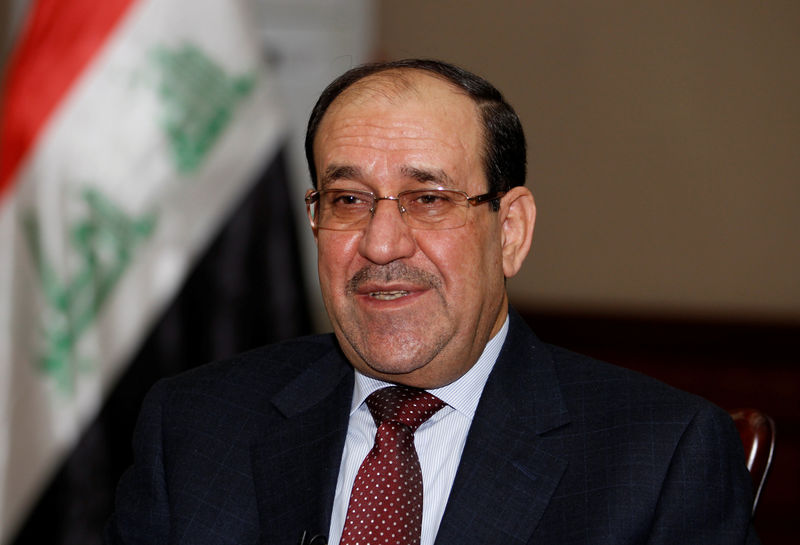By Ahmed Rasheed and Maher Chmaytelli
BAGHDAD (Reuters) - Nuri al-Maliki is once again positioning himself as Iraq's most powerful man, poised to return as kingmaker in a fight for influence that could decide Iraq's fate as a unified country after the coming battle to recapture Mosul from Islamic State.
Two years after he was pressured to leave office by both the United States and Iran for failing to stop Islamic State fighters from sweeping across the country, the former prime minister still leads a powerful Shi'ite parliamentary bloc.
In recent weeks his followers have been using their authority in parliament to dismantle the cabinet of his successor, Haidar al-Abadi.
They have held corruption hearings, forcing out the government's leading Sunni and Kurdish figures, Defence Minister Khaled al-Obeidi and Finance Minister Hoshiyar Zebari, who both deny corruption and say they were pushed out to hurt Abadi.
Maliki's office denies that he has any plans to return to the premiership, and his allies say he is more likely to try to name an ally as the next prime minister rather than take back the role for himself.
But there is now little doubt that his aim is to sideline Abadi and restore the power of his own Iran-backed Shi'ite faction, which minority Sunni and Kurdish politicians say could put Iraq's future at risk even if it vanquishes Islamic State.
Zebari, who served as foreign minister for more than a decade and was Baghdad's most senior Kurdish politician until he was forced out of the finance ministry last month, said Maliki was deliberately undermining the government on the eve of the campaign to recapture Islamic State's last major stronghold.
"They don’t want this government to succeed in Mosul," Zebari told Reuters in Erbil, the capital of Iraq's Kurdish autonomous region, referring to the northern city where U.S.-backed Iraqi forces are preparing for a major offensive.
"Because Maliki was responsible for the fall of Mosul and the melting of the Iraqi security forces under his command. So any successes here would be a major rebuke to him and his future chances of a comeback."
In the latest victory for Maliki, the supreme court ruled on Monday that Abadi violated the constitution last year by scrapping three positions of vice-president. Maliki, who became one of the three vice presidents when he left office as prime minister, will now return to that job.
Two politicians close to Maliki said parliament may soon summon Abadi himself to face questioning in parliament over his performance, as well as Foreign Minister Ibrahim al-Jaafari, another former prime minister and potential rival to Maliki.
Maliki's media office denied that the campaign against ministers in Abadi's cabinet was part of an attempt by the former prime minister to return to power and said the moves demonstrated parliament exercising its role to hold the government to account.
But allies say Maliki will seek to remove Abadi from office at the next election, whether or not Abadi, who lacks a strong political faction of his own, decides to campaign as part of an alliance with Maliki.
Maliki's "aim is not necessarily to become PM but to have the PM chosen supported by him," said Sami al-Askari, a former lawmaker who has served as an advisor to Maliki.
"If Abadi joins Maliki for the elections, Maliki will not choose him to be PM again; if Abadi runs without Maliki, he has no chance to win enough seats."
CONCILIATORY TECHNOCRAT
Maliki left office reluctantly in 2014 after the security forces crumbled and fled in the face of a lightning advance by Sunni Muslim fighters from Islamic State.
His foes, including the Obama administration in Washington, accused Maliki of having run a sectarian government during eight years in power that alienated Sunnis, driving them into the arms of Islamic State, and undermined the morale of the army.
Abadi, a conciliatory technocrat, took office promising to reduce sectarian polarisation. He swiftly introduced reforms to limit the patronage of sectarian parties by cutting the number of senior posts, although parliament has mostly fought to block or delay the changes.

Abadi has won widespread credit for rebuilding the army with American support and recapturing most of the territory seized by Islamic State. But he has not built up a political power base of his own in the parliament, which was elected in 2014 and where Maliki's faction is still the largest.
A new national election is not due until 2018. But the two politicians allied to Maliki said it could be brought forward to as soon as April next year when provincial elections are due.
Jasim al-Bahadli, a Baghdad-based political analyst, said Maliki's ambition to shape the next government was realistic given the backing he still has among majority Shi'ites.